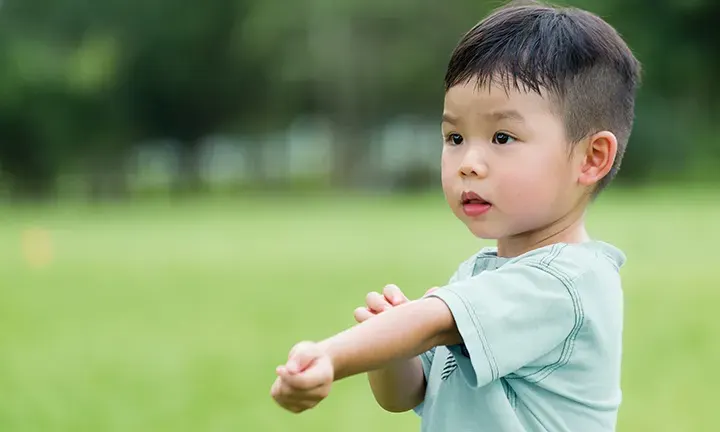How to Treat and Prevent Mosquito Bites on Babies and Older Kids
Depending on where you live, mosquitoes tend to be a summertime staple—and, sometimes, a pest all year long! Chances are, you’ll have to deal with mosquito bites on your baby or older kids at some point or another. Luckily, these itchy bites are usually just a nuisance and nothing more. Read on to learn how to prevent and treat mosquito bites on newborn babies, toddlers, and older kids, plus when to call your child’s healthcare provider.
What Does a Mosquito Bite Look Like?
Bug bites on babies and older kids are a common part of childhood, so it helps to know how to distinguish a mosquito bite from other insect bites. What does a mosquito bite look like and feel like? Mosquito bites typically cause a stinging sensation, followed by a red, circular mound (similar to a hive) that’s itchy with a tiny puncture in the center.

When a mosquito bites your baby’s skin, it injects saliva, and the swelling, redness, and itchiness are all part of the body’s natural reaction to the saliva. Some people are more sensitive to mosquito saliva than others and may have a stronger response when bitten. Additionally, the body gradually builds up a slight defense against mosquito bites. But because babies are new to the world, they won’t have built any protection yet, and their reactions to bites can be stronger.
Other signs of a mosquito bite can include
a very large area of swelling and redness
multiple hives
a low-grade fever
body aches
swollen lymph nodes.
In some babies and older children, mosquito bites on the face can lead to swelling around the eyes, too, and in general, bites on the face cause more swelling than bites on other parts of the body. If your child experiences any of these additional symptoms of mosquito bites, it’s best to consult their healthcare provider.
In Summary Mosquito bites on babies, toddlers, and older kids typically result in round, swollen, and red mounds that are quite itchy. Some children may experience a slightly stronger reaction, which could include symptoms like a low-grade fever, hives, or swollen eyes and lymph nodes. Contact your child’s healthcare provider if they experience any of those additional symptoms. |
Are Mosquito Bites Bad for Babies?
Some parents wonder when to worry about a mosquito bite on their baby or toddler. Although mostly just an itchy nuisance, mosquito bites on anyone (whether babies, older kids, or adults) come with some small risks. From time to time, a mosquito bite can become infected, and your baby's healthcare provider may prescribe antibiotics to treat the infection.
If your baby is allergic to mosquito bites, an anaphylactic reaction is possible, though very rare, and usually includes symptoms such as
extreme swelling (hives) on the skin
swelling of the tongue or mouth
trouble breathing
wheezing
weakness or unconsciousness.
An anaphylactic reaction is an emergency, so take your baby to the Emergency Room or call 911 if they exhibit any of the above symptoms.
Mosquito bites are known to transfer diseases—including chikungunya, dengue, Zika, and malaria—which are not typical in the United States but might be more common in other countries. If you’re planning to travel abroad with your baby, contact your child’s healthcare provider ahead of time and follow the prevention strategies listed below.
In Summary So, are mosquito bites bad for babies? Generally speaking, and in most cases, mosquito bites aren’t bad for babies and will only cause itchy red bumps. Occasionally, mosquito bites can become infected and require treatment with antibiotics. Keep an eye out for any signs of an allergic reaction to mosquito bites and contact your baby’s healthcare provider before planning any travel abroad. |
How to Prevent Mosquito Bites on Babies and Older Kids
Prevention is your chief goal when it comes to mosquito bites on your newborn infant, baby, toddler, or older kids—really, for anyone of any age. This means learning about the habits of these insects and taking steps to minimize exposure to them whenever possible. Here are some measures you can take to deter mosquitoes and protect everyone—babies, small children, and the whole family—from being bitten:
Use netting and repair screens. Ensure that your home’s window screens (as well as tent screens when you're camping) are intact. If you find holes, you can use simple screen repair kits that typically work by affixing a sticky piece of new screen over a hole. Use mosquito nets for an added layer of protection when sleeping outdoors or covering strollers and cribs.
Cover skin with clothing. Mosquitoes have a harder time biting through clothing, so dress babies and kids in long pants, long sleeves, hats with netting, socks, and closed-toed shoes.
Avoid dressing in bright colors or floral patterns. As these insects seem to be attracted to brighter clothing and also to flowery prints, stick to muted colors and patterns.
Skip scented products. Use unscented detergent and soaps, as mosquitoes and other bugs may be more attracted to sweet or perfumy smells.
Keep cool. For older kids, in particular, mosquito bites could be a result of sweating, as the bugs are attracted to the smell. Keep your little ones cool and hydrated throughout the day.
Avoid outdoor play and water at specific times. If your kids want to play outside or at the beach or pool, avoid dawn, dusk, or nighttime, which is when mosquitoes are more active.
Clean up around your home or property. Besides the obvious water sources such as pools, rivers, and beaches, mosquitoes can make their home in any type of water, especially standing water. Check around your home or property, and be sure to empty and clean up clogged gutters, wading pools, birdbaths, firepits, flowerpots, and anything else that collects water.
In Summary
Mosquitoes are active throughout the day (most commonly at dawn, dusk, and night) and are attracted to water, bright colors, sweat, and perfumy scents. Your best prevention methods include covering your baby’s skin with light-colored clothing, keeping your little one cool, using unscented soaps and detergent, fixing holes in screens or netting, and avoiding water at dawn and dusk.
Should You Use Insect Repellent on Babies?
A common question about preventing mosquito bites on babies is whether to use an insect repellent. One common and effective active ingredient in many insect repellents is DEET, and it's important to follow some guidelines about the use of DEET-containing products and insect repellents in general:
Don't use any product containing DEET on babies under 2 months old.
Apply insect repellent sparingly on babies and children, and make sure any repellent you use contains no more than 30 percent DEET.
Avoid applying repellent on specific areas of the skin, especially the face and hands, a sunburn, any type of rash, or cuts or wounds.
Wash off the repellent with soap and water upon returning home.
Different ages call for different approaches to many common ailments. Track your little one’s development and learn more about what to anticipate with our baby growth chart below!
How to Treat Mosquito Bites on Babies, Toddlers, and Older Kids
Although prevention is the first step, know that even when you’ve taken all possible precautions, you’re likely to find mosquito bites on your children occasionally. They can happen to anyone! Some home remedies and other strategies for treating mosquito bites on babies and older kids can help relieve redness and itchiness. Continue reading to learn
what to put on your baby or toddler to treat mosquito bites
how to relieve a mosquito bite itch on babies and toddlers
how to treat mosquito bite marks on babies, toddlers, and older kids.
Home Remedies for Mosquito Bites on Babies and Older Kids
Try these home treatment strategies for mosquito bite relief in babies, toddlers, and older kids:
Apply lotion or cream. Certain creams and lotions can help temporarily relieve mosquito bite itching for babies and older kids. Talk to your child’s healthcare provider first, but some common creams they may recommend include calamine lotion and nonprescription hydrocortisone cream. You could also use a paste made with baking soda and water.
Apply a cold compress. Because the bite is probably swollen and red, you can soothe the itchy pain with a cold compress or cool cloth.
Help your child avoid scratching. Watch your child and try to keep them from scratching too much. Scratching can lead to skin fissures and infection, which can then leave marks on the skin. Talk to your baby’s provider if mosquito bites result in marks, as some creams can help minimize any scarring.
A soothing lotion and a cool compress are simple but effective treatments for mosquito bites and marks on babies, toddlers, and older kids. They can help relieve discomfort from an itchy or swollen mosquito bite on any part of the body, including the head and face. Just be extra careful when applying lotion to the area around the eyes and mouth.
If you get the “OK” from your child’s healthcare provider to use these lotions and creams, consider keeping them in your baby’s first-aid kit, as mosquitoes can bite at any time!
For older children, your child's healthcare provider may suggest additional at-home treatments for mosquito bites or recommend or prescribe antihistamine medication to help with itching. Just remember to avoid any medication that’s not recommended by the provider.
In Summary Treating itchy mosquito bites on newborns, babies, toddlers, and older kids can be done at home following the advice of your child’s healthcare provider, who may suggest applying calamine lotion or over-the-counter hydrocortisone cream. You can also apply a cool cloth to relieve pain and itching. |
FAQS AT A GLANCE
If your child is dealing with an itchy mosquito bite, talk to their healthcare provider about applying lotion like calamine or nonprescription hydrocortisone cream. Another option is a cool compress.
The Bottom Line
Kids love to play outside when the weather is warm, so know that mosquito bites are bound to happen at some point. Follow our advice for preventing mosquito bites on babies and older kids, plus how to treat the bites when they happen. You don’t have to let your summer fun be a victim of these annoying pests! A few tricks and tips can go a long way.
How We Wrote This Article The information in this article is based on the expert advice found in trusted medical and government sources, such as the American Academy of Pediatrics and the American College of Obstetricians and Gynecologists. You can find a full list of sources used for this article below. The content on this page should not replace professional medical advice. Always consult medical professionals for full diagnosis and treatment.


